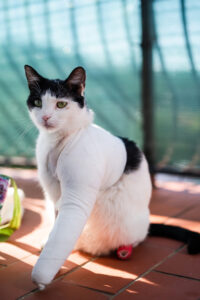
It is critical to carefully manage post-surgery care for your pets.
When our pets undergo surgery (whether it’s a routine spay/neuter or a more complex procedure), it can be stressful for the whole family. While the veterinary team provides expert medical treatment, much of the recovery process happens at home. Understanding proper post-surgery care for pets is essential to ensure a smooth healing process, reduce complications, and get your furry friend back to their happy, healthy self.
Why Post-Surgery Care Matters
Surgery places stress on your pet’s body, and recovery requires careful monitoring. The right aftercare helps prevent infections, minimizes pain, and supports faster healing. Without proper care, complications like swelling, wound reopening, or delayed healing can occur. As pet owners, being prepared with knowledge and patience makes a big difference in your pet’s comfort and safety.
Keep Your Pet Comfortable and Safe
After surgery, your pet may feel groggy, disoriented, or even anxious. Create a quiet, cozy recovery space away from other pets, children, or household distractions. Use soft bedding and ensure the area is warm and draft-free. Restrict movement, especially jumping or running, to protect stitches and surgical sites.
Monitor the Incision Site
Check your pet’s incision daily. Look for signs of redness, swelling, bleeding, or discharge. A small amount of bruising or mild swelling can be normal, but any unusual changes may indicate infection. Always follow your veterinarian’s instructions on cleaning the area, and never apply ointments, hydrogen peroxide, or other products unless specifically directed.
Manage Pain and Medications
Your veterinarian will likely prescribe pain relief or antibiotics. Stick to the dosage schedule, even if your pet seems to be feeling better. Never give over-the-counter human medications, as many are toxic to pets. If you notice signs of pain such as whining, shaking, or reluctance to move, contact your vet immediately.
Use an E-Collar or Recovery Suit
Pets often want to lick or chew at their incision, which can lead to infections or torn stitches. An Elizabethan collar (e-collar or “cone”) or a recovery suit helps keep the wound safe while it heals. While many pets dislike wearing them, they are an important part of post-surgery care for pets.
Watch for Behavioral Changes
It’s normal for pets to seem quieter or sleepier than usual after surgery. However, if your pet refuses to eat or drink, vomits, or seems unusually lethargic for more than 24 hours, contact your veterinarian. Trust your instincts—if something doesn’t seem right, it’s better to be cautious.
Follow Activity Restrictions
Your veterinarian will provide guidelines on how much rest your pet needs and when to gradually reintroduce activity. Depending on the surgery, dogs will be limited to leash walks, while cats should remain indoors with limited movement. Avoid rough play, running, and climbing until your vet clears them.
Schedule Follow-Up Visits
Veterinary follow-up appointments are essential for checking healing progress, removing stitches if needed, and ensuring your pet is on track to a full recovery. Don’t skip these check-ins, even if your pet appears to be doing well.
Help Pets Heal Through Post-Surgery Care
Providing the best post-surgery care for pets requires patience, love, and attention to detail. By creating a calm recovery environment, following veterinary instructions, and monitoring your pet closely, you can help them heal quickly and safely. Remember—your furry family member depends on you to guide them through recovery, and your care makes all the difference in their healing journey.
Trust Maryland Veterinary Surgical Services With Your Companion’s Health
Your companion’s health is important, and the team at MVSS is ready to provide the best care possible for your furry family. We are dedicated to combining comprehensive exams and assessments with informative and honest discussions of your companion’s care. Once we have worked with you to decide on the best course of action for your dog, our professionals will use their surgical expertise to work towards the goal of giving your companion an active and pain-free life. We are proud to serve loyal companions in Catonsville and Baltimore. To learn more about our services, give us a call at 410-788-4088 or visit us online. For more information and tips for dog health, follow us on Facebook and Pinterest.
